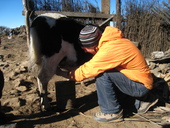Highlight
Medicinal plant cultivation and conservation in Nepal
Achievement/Results
UC Davis graduate student William Wetzel worked with staff from the non-profit organization The Mountain Institute to study cultivation of medicinal plants in eastern Nepal. His work may improve both the livelihoods of rural farmers and biological conservation in the region.
Wetzel investigated opportunities for improving and extending the cultivation project, assessed farmers’ interest in processing medicinal plants locally, investigated diseases in one commonly cultivated medicinal plant (chiraito-Swertia chirayita), and to evaluated the conservation value of the cultivation program. He conducted semi-structured interviews of farmers, toured farms, and took field observations of the disease distribution to investigate chiraito diseases. Two Nepalis assisted Wetzel as translators, research colleagues, and guides.
Wetzel found that the TMI program has been successful in winning the support and trust of local farmers, especially those with larger operations and who seemed influential in their communities. Farmers in general had very positive reactions to TMI. They often praised TMI as an organization, the work it has done, and saw chiraito as a way to improve their economic situation. Farmers also frequently cited the importance of not over-collecting wild MAPs and of preserving wild habitats in community forests. He concluded that TMI’s conservation message has clearly reached the farmers and many seem to genuinely believe in resource conservation and sustainable resource use.
When asked about their problems and what TMI could do to help, the two most common issues that farmers identified were marketing and crop diseases.
There were two major chiraito diseases: a root rot, perhaps caused by a fungus, and a stem-boring caterpillar. Wetzel could not detect obvious patterns in infestation and recommended that TMI staff collect samples of diseased plants to plant pathologists and entomologist in the government or in universities in Kathmandu.
Many farmers also specifically mentioned that they believed that opening a local processing facility would help in processing and convey important long-term benefits. Wetzel made specific recommendations about TMI opening such a facility to meet both local economic and conservation goals. TMI could make local processing a reality via two mechanisms: facilitating direct local investment vs. funding the machine in return for local conservation work.
Wetzel also found that the success of TMI’s promotion of chiraito as a cash crop has two major unintended consequences. The first is that farmers clear and burn previously unused (though private) land for the purpose of growing chiraito. The second unintended consequence is that farmers are growing chiraito on lands previously used for food crops.
Accordingly, Wetzel urged caution in the TMI program for cultivating medicinal plants lest the region become a chiraito monoculture. He recommended that TMI develop an explicit plan for these regions. He further recommended that TMI teach farmers about agricultural diversification, promote tree plantations, and find additional medicinal plant species that are in demand in foreign markets.
Wetzel’s work in Nepal was supported by the National Science Foundation via the UC Davis Responding to Rapid Environmental Change IGERT program.
Address Goals
In his work in Nepal, Wetzel worked in a sensitive high-altitude region in which subsistence agriculture and biological conservation must coexist. Insights gained during his internship will better inform his work as a scientist.
Wetzel also made specific recommendations about how The Mountain Institute could improve its medicinal plant program and thus achieve both economic and conservation goals.








